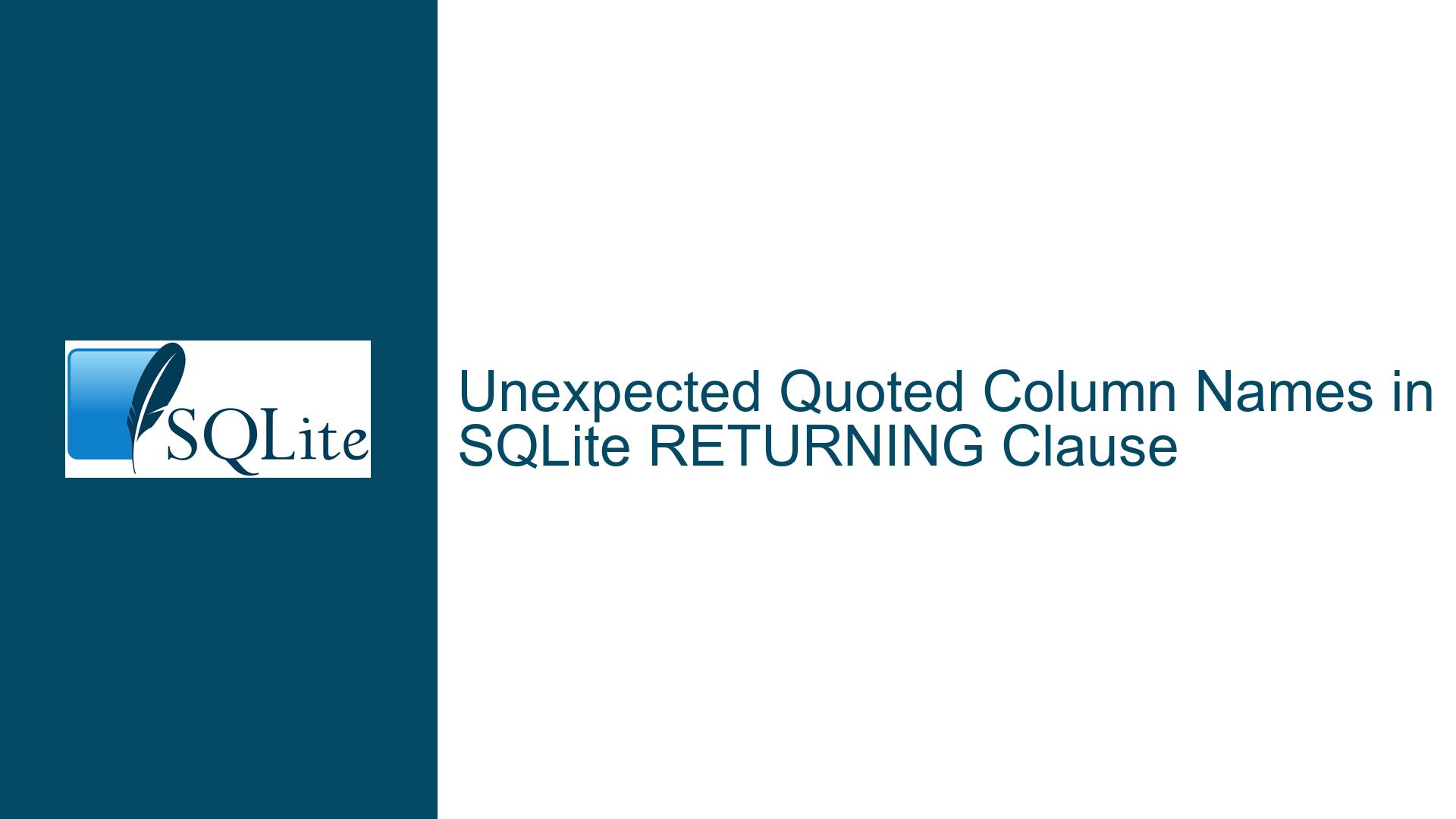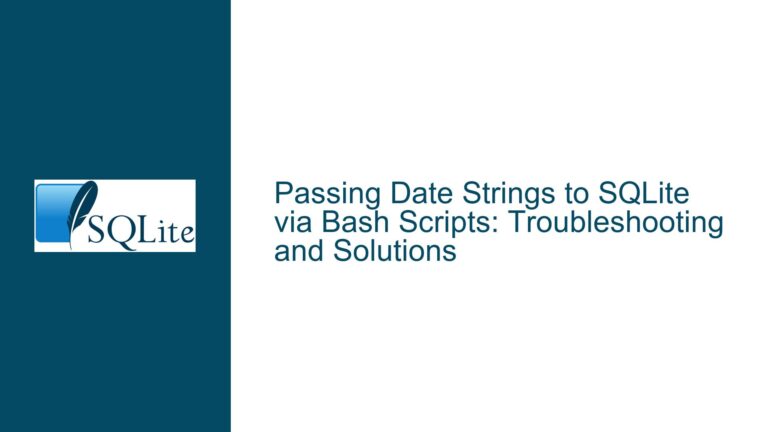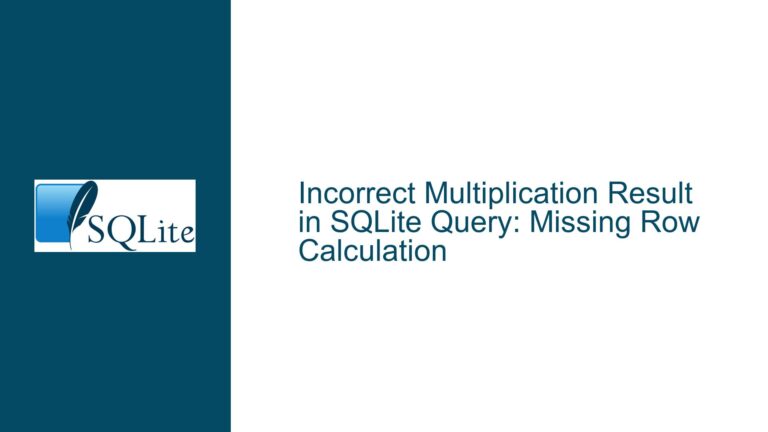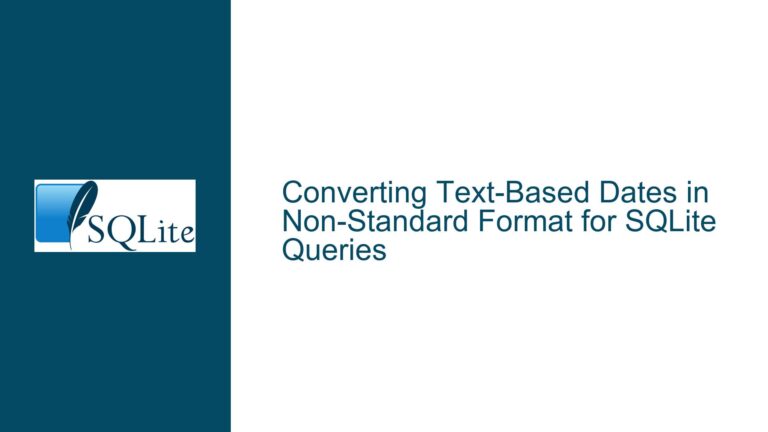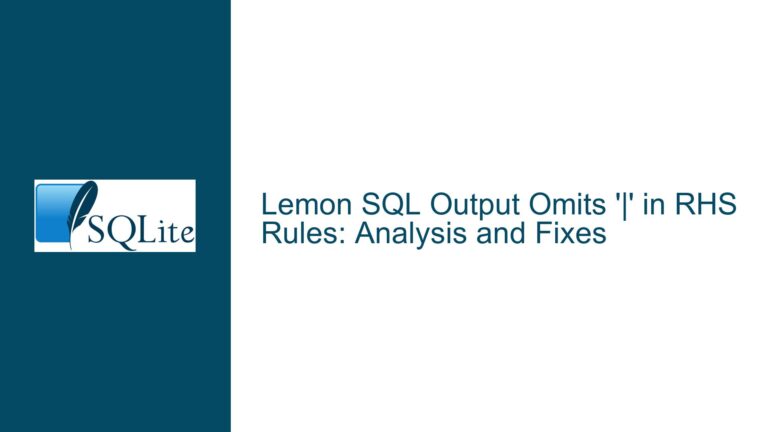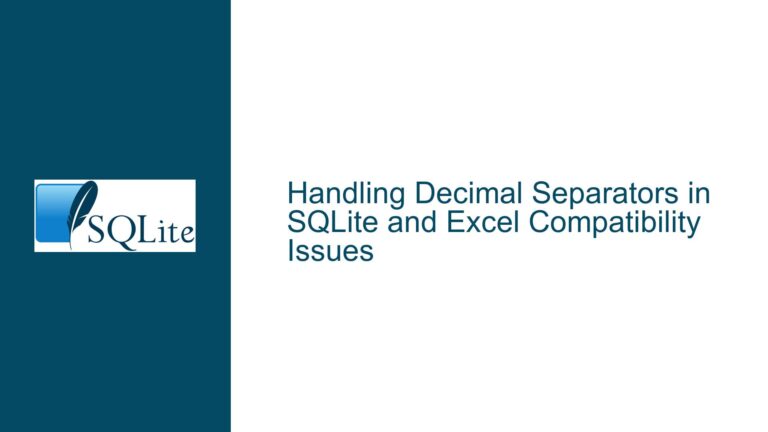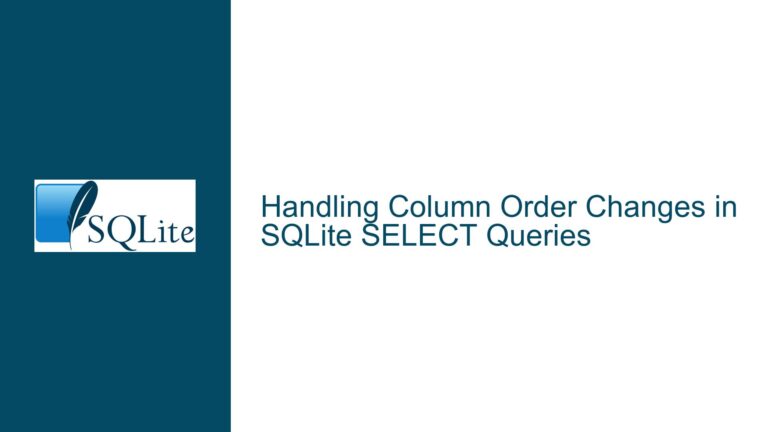Unexpected Quoted Column Names in SQLite RETURNING Clause
Technical Analysis of Column Identifier Handling in RETURNING Expressions
The interaction between SQLite’s RETURNING clause and column identifier quotation reveals a nuanced behavioral discrepancy impacting output consistency across SQL operations. This behavior manifests when developers use non-standard identifier quotation marks (backticks or double quotes " ") in INSERT…RETURNING statements compared to equivalent SELECT operations. The core anomaly lies in SQLite’s expression resolution mechanism for RETURNING clauses, which preserves quotation marks in generated column headers unless explicitly aliased – a deviation from standard SELECT statement behavior where quotation marks are stripped during column name resolution.
This discrepancy becomes critical when applications rely on consistent column naming between write operations (using RETURNING) and read operations (using SELECT). The preservation of quotation characters in RETURNING output headers can break data mapping layers expecting identical column identifiers across both contexts. A concrete example shows INSERT…RETURNING t producing a column header containing backticks (t), while SELECT t from the same table returns an unquoted "t" header. Similar behavior occurs with double-quoted identifiers in RETURNING clauses.
Underlying Mechanisms of Column Label Generation
Three primary factors contribute to this behavioral anomaly in SQLite’s implementation:
Expression Type Resolution Variance
- RETURNING clause processing uses different expression typing rules compared to SELECT statements
- The parser treats quoted identifiers as literal strings when not matching existing columns
- Column label generation skips dequoting steps applied in standard projection contexts
Identifier Normalization Pipeline Differences
- SELECT statements pass identifiers through full normalization:
Tokenization → Dequoting → Collation Sequence Application - RETURNING clause processing short-circuits at the dequoting stage for certain expression types
- The sqlite3Dequote() function only executes when specific expression flags are present
- SELECT statements pass identifiers through full normalization:
Column Label Generation Heuristics
- Unaliased expressions in RETURNING use raw expression text for column labels
- The ENAME_NAME flag doesn’t get set for quoted identifiers without explicit aliases
- Expression expansion logic in sqlite3ExpandReturning() skips dequoting operations
/* Pre-patch code snippet from sqlite3.c */ pItem->zEName = sqlite3DbStrDup(db, pList->a[i].zEName); pItem->eEName = pList->a[i].eEName; - Contrasts with SELECT processing which applies dequoting through multiple normalization layers
The interaction between these systems creates an inconsistency window where quoted identifiers maintain their quotation marks in RETURNING output headers but lose them in equivalent SELECT projections. This becomes particularly problematic when using SQLite’s non-standard identifier quotation mechanisms (backticks and square brackets) that other databases don’t support.
Resolution Strategies for Consistent Column Labeling
1. Query-Level Workarounds
Explicit Column Aliasing
Force dequoting through AS clauses:
INSERT INTO a VALUES (1) RETURNING "t" AS t;
This triggers the ENAME_NAME flag in the expression parser, enabling full dequoting
Identifier Normalization
Use standard SQL double-quotes for identifiers:
CREATE TABLE a ("t" INTEGER); -- Standard-compliant quotation
INSERT INTO a VALUES (1) RETURNING "t"; -- Returns "t" header
SELECT "t" FROM a; -- Returns "t" header (consistent behavior)
Maintains quotation in both contexts but requires schema changes
Expression Type Casting
Force numeric interpretation of quoted identifiers:
INSERT INTO a VALUES (1) RETURNING CAST("t" AS INTEGER);
Bypasses identifier resolution by treating "t" as expression
2. Schema Design Adjustments
Non-Quoted Identifiers
CREATE TABLE a (t INTEGER); -- Remove quotation from schema definition
INSERT INTO a VALUES (1) RETURNING t; -- Unquoted reference
Eliminates quotation discrepancies at the cost of identifier flexibility
Materialized Column Aliases
CREATE VIEW a_returning AS
SELECT t AS returning_t FROM a;
Decouples RETURNING output naming from base table structure
3. SQLite Modification Strategies
Application of Community Patch
The proposed source modification adds dequoting logic to RETURNING processing:
/* Patched code from sqlite3.c */
if ( pList->a[i].eEName!=ENAME_NAME && pOldExpr->op==TK_ID ){
sqlite3Dequote(pItem->zEName);
}
This change requires:
- Confirming SQLite version compatibility (3.35.5 in original report)
- Testing edge cases with mixed quotation styles
- Benchmarking performance impact on write operations
Compilation Flag Adjustment
Recompile SQLite with:
-DSQLITE_ENABLE_RETURNING_DEQUOTE=1
Enables universal dequoting in RETURNING clauses through build configuration
4. Client-Side Normalization
Result Set Post-Processing
Implement automatic dequoting in data access layers:
def dequote_columns(cursor):
return [col.replace('"','').replace('`','') for col in cursor.description]
Applies consistent naming across all SQL operations
Prepared Statement Wrapping
Intercept queries to normalize RETURNING clauses:
def normalize_returning(query):
return re.sub(r'RETURNING\s+(`|")(\w+)\1', r'RETURNING \2 AS \2', query)
Automatically adds AS clauses to RETURNING projections
5. Version-Specific Contingencies
SQLite 3.35.0-3.35.5 Behavior
- Original quoted identifier preservation
- Requires client-side workarounds
SQLite 3.36.0+ Considerations
- Monitor changelogs for RETURNING clause improvements
- Test with newer versions for potential upstream fixes
Cross-Version Compatibility Layer
CASE
WHEN sqlite_version() >= '3.36' THEN "t"
ELSE "t" AS t
END
Conditional SQL generation based on detected SQLite version
Implementation Roadmap for Robust Solutions
Step 1: Behavioral Validation
sqlite3 test.db ".headers on" \
"CREATE TABLE tst (a);" \
"INSERT INTO tst VALUES (1) RETURNING `a`;"
Verify output column header shows a
Step 2: Isolation Testing
Create minimal reproduction case:
import sqlite3
def test_returning_quotation():
conn = sqlite3.connect(':memory:')
conn.execute("CREATE TABLE test (id INTEGER PRIMARY KEY, val TEXT)")
cur = conn.execute("INSERT INTO test (val) VALUES ('test') RETURNING `val`")
print("Column header:", cur.description) # Expects 'val' but gets '`val`'
Step 3: Workaround Implementation
Choose appropriate mitigation based on application constraints:
# Example: Client-side dequoting
conn.set_trace_callback(lambda q: print("Executing:", q))
conn.execute("INSERT INTO test (val) VALUES (?) RETURNING val AS unquoted_val", ('test2',))
Step 4: Monitoring and Regression Prevention
Implement automated schema checks:
SELECT name FROM sqlite_master
WHERE sql LIKE '%RETURNING%'
AND sql NOT LIKE '% AS %';
Flag queries using RETURNING without explicit aliases
Step 5: Long-Term Schema Strategy
Adopt naming conventions resilient to quotation issues:
CREATE TABLE device_metrics (
metric_id INTEGER PRIMARY KEY,
metric_value REAL CHECK(json_valid(metric_value))
) WITHOUT ROWID;
Utilizes JSON validation instead of quoted identifiers
This comprehensive approach addresses both immediate workarounds and long-term prevention strategies while maintaining compatibility across SQLite versions. Application architects should prioritize client-side normalization for existing deployments while advocating for schema changes in greenfield projects to avoid quoted identifiers entirely. Database administrators managing embedded SQLite instances should consider applying the community patch with proper regression testing, particularly focusing on edge cases with Unicode identifiers and mixed quotation styles.
